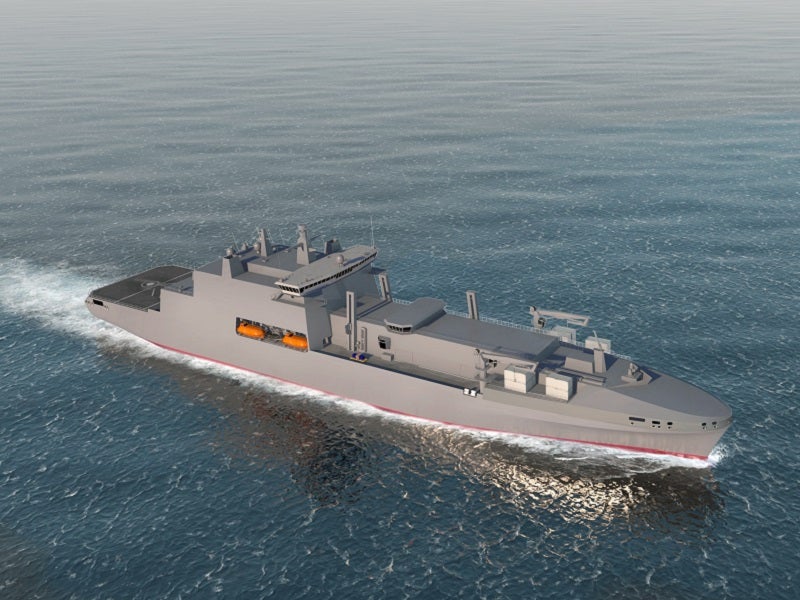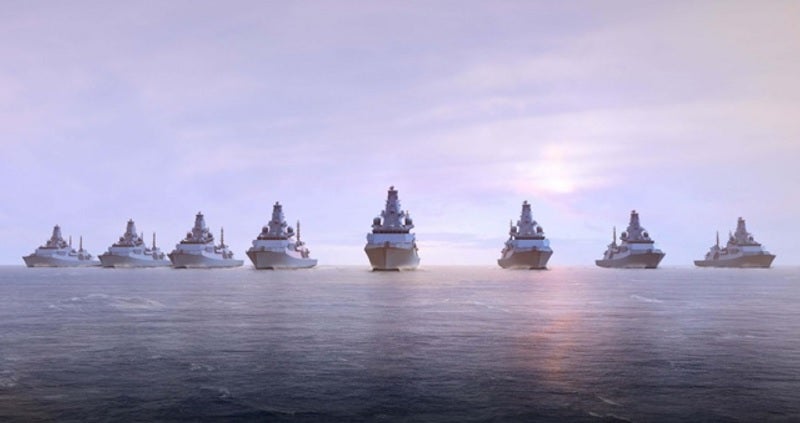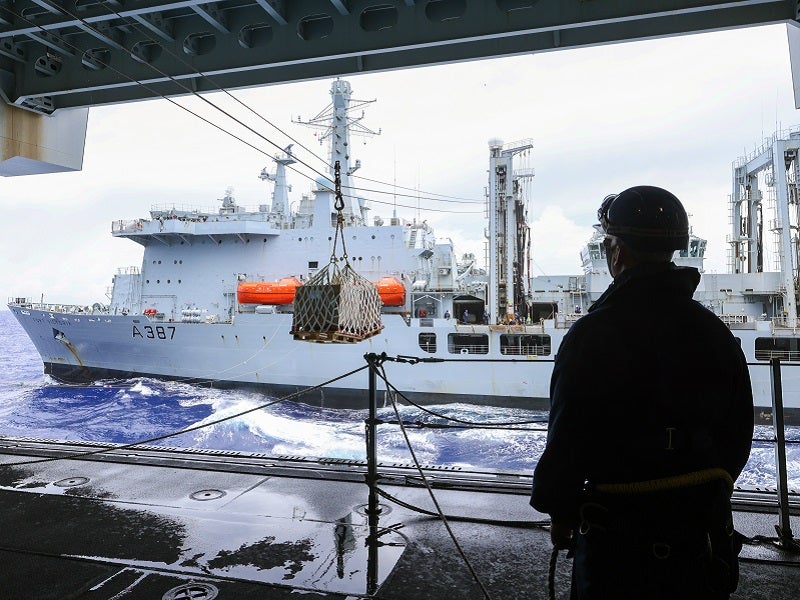
Just days before the UK’s Autumn financial statement, which will spell out the scale of spending cuts the UK Government will have to make over the coming years, the Ministry of Defence (MoD) has moved to commit billions of pounds to key shipbuilding programmes that will deliver much-needed fleet renewal capabilities to the ageing fleets of the Royal Navy and Royal Fleet Auxiliary.
The timing of the announcements, a £4.2bn contract to BAE Systems for the manufacture of the five Batch 2 Type 26 frigates, and preferred bidder status awarded to Team Resolute for the £1.6bn Future Solid Support Ship programme, on 15 and 16 November respectively, indicate a determination among the MoD that defence is given the ability to maintain its spending programme for the years ahead.
The 16 November announcement of Team Resolute as preferred bidder to manufacture a fleet of three Future Solid Support (FSS) ships destined for the UK’s Royal Fleet Auxiliary (RFA), offers the prospect of finally moving the programme forward after five years of delays and political wrangling. The £1.6bn contract is subject to HM Treasury and Ministerial approval.
Effectively, over a 24-hour period the MoD either awarded or announced preferred bidder status for two programmes that will deliver eight vessels across four UK sites for a combined cost of nearly £6bn, just a day before the Chancellor of the Exchequer delivers the Autumn Statement.

Support for Future Solid Support
Initiated in 2017 but suspended in 2019 following an aborted competition over fears of value for money to the UK taxpayer, the Fleet Solid Support (FSS) programme will now see the vessels build at Harland and Wolff’s Belfast and Appledore sites, as well as Spanish shipbuilder Navantia’s Cadiz facility.
The inclusion of Spanish shipyard Navantia for the FSS programme will be controversial, with UK unions having pushed hard for the entire build to be sited inside the country. Earlier this month the GMB union argued for “cast iron guarantees” for UK yards given that the £1.6bn contract looked set, as it claimed, “to go overseas”.
GMB stated that Spanish government owned Navantia “has a history of receiving state subsidies”, and that the contract should go to the consortium with the most UK workshare.
UK Defence Secretary Ben Wallace has long argued that much of the programme would be located in the UK, but consistently ruled out cutting out foreign shipyards for the competition. A key element of the FSS announcement regarding Navantia is that while build work will be undertaken in Cadiz, the deal also included for the transfer of key skills and shipbuilding technology to UK sites, primarily in Harland and Wolff’s Belfast and Appledore sites.
Appointed Shipbuilding Tsar in 2019, Wallace told the UK Defence Committee during a 5 July session this year that UK shipyards, both those focused towards military or commercial alike, had to invest in their own facilities in order to increase capacity, efficiencies and competitiveness.
“Some yards are ready for the future, and some aren’t,” he said at the time.
When asked during the same sessions about the prospect for the FSS vessels being manufactured overseas (as was done with the Tide-class replenishment tankers currently in service), Wallace said that the “majority” of any such programme would be performed in the UK, either as build or systems integration.
“If a British bid said it wasn’t going to invest in yards, or a foreign bid said it would invest in British yards, which would you select?” Wallace told the committee.
Team Resolute have stated that £77m will be invested into shipyard infrastructure in the UK shipbuilding sector, with an aim to “create one of the most advanced yards in the UK, significant for future export and domestic shipbuilding and offshore opportunities”.
According to the MoD the preferred bidder proposal pledges that the entire final assembly for all three ships will be completed at Harland and Wolff’s shipyard in Belfast, with the three 216m-long vessels being built to Bath-based BMT’s entirely British design. As earlier stated, the block-build nature of the programme will see elements built at separate yards, enabling distributed workshare, before being brought together for assembly.

The ships will be the second longest UK military vessels behind the two Queen Elizabeth-class aircraft carriers. They will have commonality with the RFA’s Tide class fleet tankers, also built to a British BMT design.
UK Secretary of State for Northern Ireland, Chris Heaton-Harris said that the announcement was “fantastic testimony” to Belfast’s shipbuilding heritage.
Production is due to start in 2025 and all three support ships are expected to be operational by 2032, with the manufacture contract due to be awarded by the MoD’s DE&S by Q1 2023, subject to completion of a successful preferred bidder stage and final approvals.
Investment into UK regions
Also in the 16 November announcement, Vice Admiral Paul Marshall, DE&S Director General Ships, spoke of the “significant investment in emerging shipyards across the UK” that would serve to “diversify” the country’s industrial base.
“Alongside our investment in the Type 26 and Type 31 frigate programmes, this breadth will be vital to grow and support a highly capable and modern navy,” Marshall said.
This move to diversify the maritime industrial base, a move clearly championed by Wallace, appears to be at the core of the decision to go with Team Resolute. The shipyards of rival bids from BAE Systems and Babcock are occupied with the Type 26 and Type 31 frigate builds respectively, with the latter company likely to benefit from the forthcoming Type 32 ‘motherships’ planned to replace the Sandown- and Hunt-class mine countermeasure vessels, while BAE Systems will also build the future Type 83 air defence destroyers, in replacement of the in-service Type 45s.
Madeline Wild, aerospace, defense and security analyst at GlobalData, said that the announcement of a preferred bidder status to Team Resolute indicates that the MoD “no longer follows ‘global competition by default’”, and would see defence spending used as an investment tool to improve the social and economic positions of regions across the UK.
“Final construction will take place at the Harland and Wolff’s Belfast shipyard and will be the first vessels constructed there since 2003. This is a notable pivot away from the Scottish shipyards that have been responsible for the construction of many Royal Navy surface vessels, including the Type 26 and Queen Elizabeth-class carriers.
“The move from Scotland to Northern Ireland will allow the economic and social value of domestic defense spending to be felt across the UK, spread between regions and reinvigorating historic shipbuilding hubs,” Wild said.



